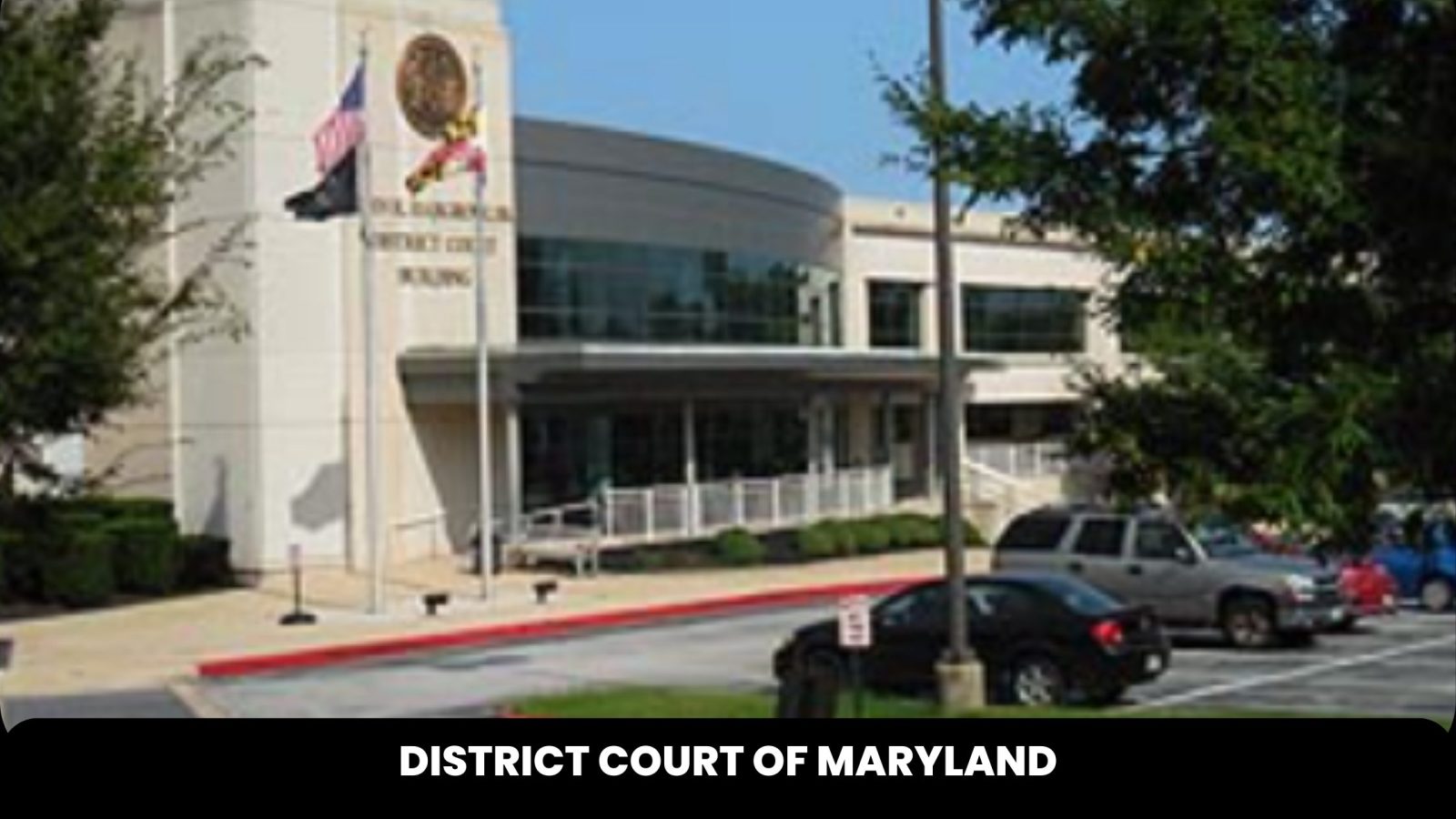District Court of Maryland
Introduction
The District Court of Maryland is a state court that handles a variety of legal cases, including criminal, civil, and family cases. It is the first level of trial court in Maryland and plays an important role in the administration of justice in the state.
The history of the District Court of Maryland dates back to the colonial period, when it was established to serve as a local court for the residents of the state. Today, the District Court of Maryland is a modern court that is equipped with the latest technology and staffed by experienced judges and court personnel.
Jurisdiction of the District Court of Maryland
The District Court of Maryland has jurisdiction over a wide range of legal cases, including criminal, civil, and family cases.
In criminal cases, the District Court of Maryland has jurisdiction over misdemeanors and certain felonies. In civil cases, the court has jurisdiction over cases involving amounts of up to $30,000. The District Court of Maryland also has jurisdiction over family cases, such as divorce, child custody, and child support cases.
Types of Cases Heard in the District Court of Maryland
The District Court of Maryland hears a wide range of legal cases, including traffic cases, small claims cases, landlord and tenant cases, and criminal misdemeanors.
Traffic cases involve traffic violations, such as speeding, reckless driving, and driving under the influence. Small claims cases involve disputes between individuals over money or property, and the amount in dispute is typically less than $5,000. Landlord and tenant cases involve disputes between landlords and tenants over issues such as rent, evictions, and property repairs. Criminal misdemeanors are minor criminal offenses, such as disorderly conduct and petty theft.
The Process of a Trial in the District Court of Maryland
The trial process in the District Court of Maryland begins with the filing of a complaint by the plaintiff. The pre-trial process involves the exchange of information and evidence between the parties, and the opportunity for the parties to negotiate a settlement. If a settlement is not reached, the case will proceed to trial.
During the trial, the judge will hear evidence and testimony from witnesses, and make a decision based on the law and the facts of the case. If the defendant is found guilty, the judge will impose a sentence, which may include fines, imprisonment, or community service.
Appealing a Decision in the District Court of Maryland
If a party is dissatisfied with the decision of the District Court of Maryland, they may have the right to appeal the decision to a higher court. The grounds for appeal in the District Court of Maryland include errors of law, errors of fact, and errors of procedure.
The appeal process in the District Court of Maryland involves filing a notice of appeal with the court, and presenting the case to a higher court for review. The higher court will consider the legal arguments presented by both parties and make a decision based on the law and the facts of the case.
The Judges of the District Court of Maryland
The District Court of Maryland is staffed by experienced judges who are appointed to the bench by the governor of Maryland. To qualify for appointment as a judge in the District Court of Maryland, a person must be a licensed attorney in the state of Maryland and have at least 10 years of experience as a practicing attorney.
The judges of the District Court of Maryland are responsible for overseeing the administration of justice in the court and making decisions on the cases that come before them. They are impartial and impartiality is essential to ensure that justice is served.
Jury Duty in the District Court of Maryland
Jury duty is an important civic responsibility in the District Court of Maryland. In order to serve on a jury in the District Court of Maryland, a person must be a resident of the state, at least 18 years of age, and have no disqualifying criminal convictions.
The jury selection process in the District Court of Maryland involves a review of potential jurors to ensure that they are qualified and impartial. During jury service, jurors listen to evidence and testimony in a trial and make a decision based on the law and the facts of the case.
Representing Yourself in the District Court of Maryland
In the District Court of Maryland, a person has the right to represent themselves in a legal case if they choose to do so. While representing oneself in court can have some advantages, such as lower legal costs, it can also be disadvantageous, as the individual may not have the legal knowledge and experience necessary to effectively present their case.
If a person chooses to represent themselves in the District Court of Maryland, there are resources available to help, including self-help guides and legal aid organizations.
Legal Assistance in the District Court of Maryland
In the District Court of Maryland, a person has the option to hire a private attorney to represent them in a legal case. Attorneys can provide legal advice and represent their clients in court, and can be especially helpful in complex cases.
For those who cannot afford a private attorney, there are legal aid organizations in the state of Maryland that provide free or low-cost legal services to eligible individuals.
The Courtroom in the District Court of Maryland
The courtroom in the District Court of Maryland is a formal setting where justice is administered. Courtroom etiquette and decorum are important to ensure that the proceedings are respectful and dignified.
In the District Court of Maryland, all parties and spectators are expected to dress appropriately and behave in a respectful manner. Cell phones and other electronic devices must be turned off, and talking or making noise in the courtroom is generally not allowed.
Case Search in the District Court of Maryland
If you are looking for information about a case in the District Court of Maryland, you can perform a case search either online or in-person.
The online case search allows you to search for cases by case number, party name, or attorney name. You can access the online case search from the District Court of Maryland’s website.
In-person case search can be performed at any of the District Court of Maryland locations. Simply bring a photo ID and provide the necessary information to the court clerk.
Contacting the District Court of Maryland
If you need to contact the District Court of Maryland, you can do so by phone or by visiting one of the court locations in person.
The phone number for the District Court of Maryland can be found on the court’s website. If you need to visit a District Court of Maryland location in person, you can find the address on the court’s website or by calling the court.
Paying a Ticket in the District Court of Maryland
If you have received a ticket in the District Court of Maryland, you have several options for paying the fine. You can pay online, by mail, or in person at a court location.
To pay online, visit the District Court of Maryland’s website and follow the instructions for paying a ticket. You will need to provide the ticket number and your payment information.
District Court of Maryland Locations
The District Court of Maryland has several locations throughout the state, including Baltimore City and Salisbury. You can find the address of a District Court of Maryland location near you on the court’s website.
Forms for the District Court of Maryland
If you need a form for the District Court of Maryland, you can find commonly used forms on the court’s website. You can also obtain forms in person at a court location.
Conclusion
The District Court of Maryland plays a vital role in the administration of justice in the state of Maryland. With jurisdiction over a wide range of legal cases, including criminal, civil, and family cases, the District Court of Maryland provides residents with access to a fair and impartial system of justice.
From the trial process to appealing a decision, to representing oneself in court and seeking legal assistance, the District Court of Maryland offers a variety of options for individuals who are involved in a legal dispute. By following the rules of the court and respecting the proceedings, all parties can have confidence in the fairness and integrity of the District Court of Maryland.
FAQs
What is the District Court of Maryland?
The District Court of Maryland is a state court that handles a variety of legal cases, including criminal, civil, and family cases. It is the first level of trial court in Maryland.
What types of cases are heard in the District Court of Maryland?
The District Court of Maryland hears a wide range of legal cases, including traffic cases, small claims cases, landlord and tenant cases, criminal misdemeanors, and more.
How does the trial process work in the District Court of Maryland?
The trial process in the District Court of Maryland begins with the filing of a complaint and proceeds through the pre-trial process, trial, and sentencing.
Can I represent myself in the District Court of Maryland?
Yes, a person has the right to represent themselves in the District Court of Maryland if they choose to do so. However, self-representation can be disadvantageous, and it is recommended to seek the assistance of a private attorney or a legal aid organization.
What resources are available for legal assistance in the District Court of Maryland?
Legal assistance is available in the District Court of Maryland through private attorneys and legal aid organizations. Legal aid organizations provide free or low-cost legal services to eligible individuals.






